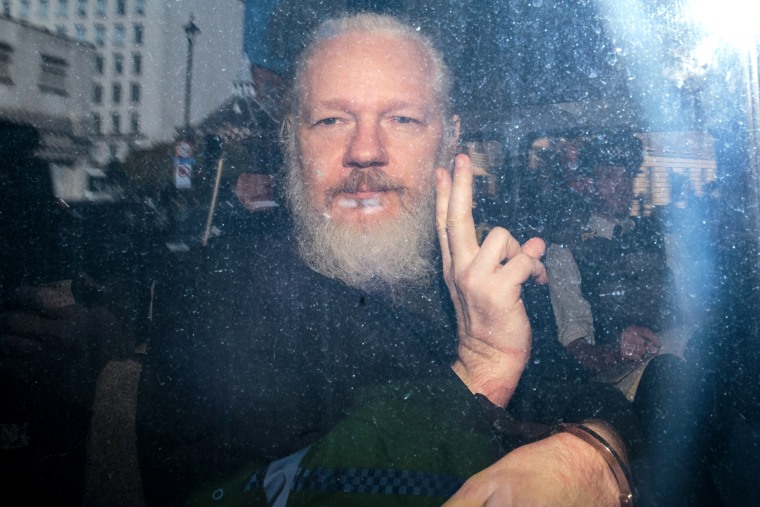LONDON — WikiLeaks founder Julian Assange was offered a presidential pardon if he helped to resolve the "ongoing speculation about Russian involvement" in the hacking of Democratic National Committee emails leaked during the 2016 U.S. election campaign, a London court heard Friday.
Assange's lawyer, Jennifer Robinson, said she saw then-Rep. Dana Rohrabacher, R-Calif., and Trump associate Charles Johnson make the offer during an August 2017 meeting at London's Ecuadorian Embassy, where Assange was evading arrest at the time. His seven-year stay there came to an end in April 2019 when Ecuador revoked his political asylum and invited police officers inside to arrest him.
Rohrabacher and Johnson said Trump knew about the meeting and approved offering Assange what they described as a "win-win" proposal, according to Robinson's statement provided to Assange's hearing in Old Bailey court.
Assange, 49, is fighting extradition to the U.S. where he faces up to 175 years in prison on espionage charges over WikiLeaks' release of confidential diplomatic cables in 2010 and 2011.
Download the NBC News app for breaking news and politics
"Rohrabacher explained that he wanted to resolve the ongoing speculation about Russian involvement in the Democratic National Committee (DNC) leaks to WikiLeaks," Robinson said. "He said that he regarded the ongoing speculation as damaging to U.S.-Russian relations, that it was reviving old Cold War politics, and that it would be in the best interests of the U.S. if the matter could be resolved."
In return, the men offered "some form of pardon, assurance or agreement which would both benefit President Trump politically and prevent U.S. incitement and extradition" for Assange, Robinson said in the statement.
At the hearing Friday, James Lewis, prosecutor for the U.S. government, said: "The position of the government is we don't contest these things were said. We obviously do not accept the truth of what was said by others."
Robinson said she and Assange asked the men to make the case to Trump that he should be released purely on First Amendment grounds, noting that President Barack Obama had already commuted the sentence of Chelsea Manning, the former Army intelligence analyst previously sentenced to 35 years for giving classified information to WikiLeaks.
They did not offer to disclose the source of the leaks because that would not be "consistent with WikiLeaks editorial policy," she said.
Responding to the claims when they surfaced earlier this year, White House press secretary Stephanie Grisham called the allegations "absolutely and completely false."
Trump "barely knows Dana Rohrabacher other than he's an ex-congressman. He's never spoken to him on this subject or almost any subject," Grisham said. "It is a complete fabrication and a total lie. This is probably another never-ending hoax and total lie from the DNC."
Rohrabacher has also denied making such an offer.
"At no time did I offer Julian Assange anything from the president because I had not spoken with the president about this issue at all," Rohrabacher said in a February statement. "However, when speaking with Julian Assange, I told him that if he could provide me information and evidence about who actually gave him the DNC emails, I would then call on President Trump to pardon him."
He said that on his return to Washington he "wasn't successful in getting this message through to the president" but that "I still call on him to pardon Julian Assange, who is the true whistleblower of our time."

